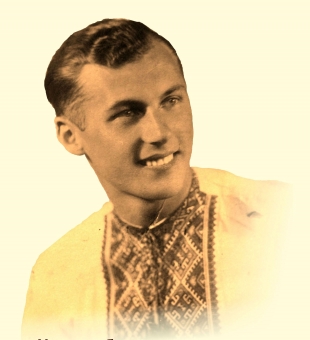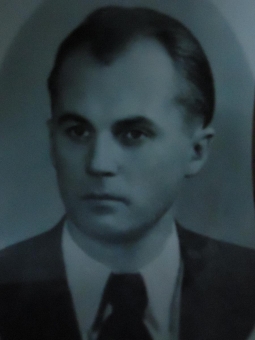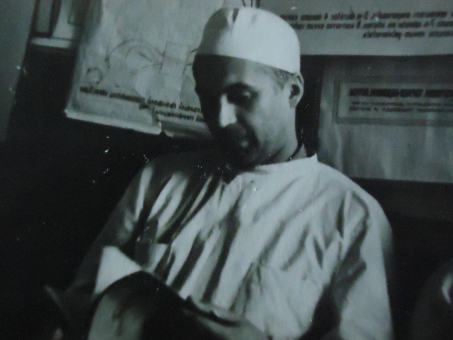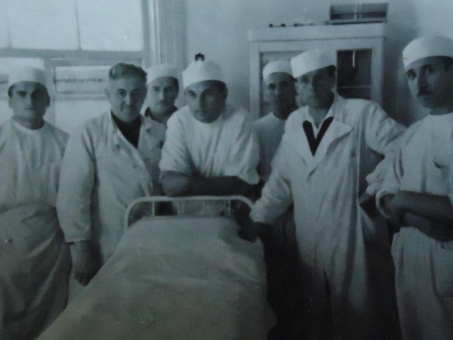Volodymyr Maniukh

Pseudonym - "Borys". Volodymyr Manyukh (ukrainian: Володимир Манюх) was born in 1921 in Yabluniv village of Galyckyi district, Ivano-Frankivsk region.
He graduated Stanislaviv high school and Lyceum of Natural Sciences. One year he worked as a teacher in his native village. In 1940 he entered the Lviv Medical Institute. In 1944 he interrupted his studies and joined the ranks of the Ukrainian Red Cross (URC) of the Ukrainian Insurgent Army (UIA). On behalf of the URC he organized a mobile hospital of the UIA in Strilyska Stari village. Then he moved to Stanislaviv where he was employed at the regional hospital. In 1945 he entered the Stanislaviv Medical Institute and worked at the Department of Comparative Anatomy. After graduating it with honors (1947) he worked as a researcher at the Department of Surgery.
Although Volodymyr Manyukh came from a simple Galyckyi family, he was a very educated and erudite man. While working in Ivano-Frankivsk Regional Hospital he remained above suspicion of the Soviet Special Forces. Often at night, being accompanied by the insurgents, he set out on a dangerous journey to the forest bunker or a peasant house to provide first aid to a seriously wounded Ukrainian Insurgent. There was also equipped a secret ward at the regional hospital, where Volodymyr Manyukh and his colleagues performed more than 150 complicated surgeries.
`Of course the Ukrainian Insurgent Army was well organized and structured, it had all the features of the regular troops,` says Vasyl Tymkiv - a leading researcher of the museum. `It was not surprising that there were health care units attached to the headquarters of military districts. A medical and health department organized small hospitals, which were called "shpytalky", ligation stations, took care of the sick and wounded. A pharmaceutical department provided with medicines, a charitable department took care of OUN and UIA family members, who were arrested or sentenced, and orphans. An economic department organized practical training of physicians.`
Nowadays it is hard to imagine the exceptionally difficult circumstances, in which the Ukrainian Insurgents were operated and taken care of, continuous risks and sacrifice of the UIA doctors. Yet they had to work under the German and then the Soviet occupation. Those who spent days and nights in forest underground bunkers felt constant psychological pressure: when the NKVD (the People's Commissariat for Internal Affairs) members scoured remote areas and found the “forest hospitals” there was only one end - the death. Patients of those hospitals and their saviors-doctors fought to the end as, for example, Catherine Lukan (pseudo Galyna) from the Hutsulian Kobaky village, who blew herself up by a grenade when she was surrounded in a bunker by NKVD members.
`The underground hospitals were built only by the UIA members to minimize the risk of being found out, says Jaroslav Korytchuk – the Ivano-Frankivsk researcher of the national liberation struggle of the mid-twentieth century. In warm season two swarms of insurgents (20-30 soldiers) came from another region to the thoroughly prepared place intended for the hospital. During one month they constructed an object without any contact with the local population. The provisions were delivered by the net of OUN members, who did not know for whom the food was prepared. A medical structure was usually composed of several small sections: an operating room, a room for medical men, a supply section and a ward that had room for about a dozen sick and wounded. After completing the work insurgents masked the bunker and returned to their previous deployment. Only then the medical personnel and the guard quietly came to the “forest hospital.”
The insurgents did not wait for the foreign aid. Unlike national liberation movements in Europe of that time, the medicine of UIA and illegal Ukrainian Red Cross for various reasons were not taken into attention of the Red Cross. They could only rely on their own strength, and the support of their adherents, who worked in Soviet hospitals and deliberately accepted the risks. The Insurgent Security System conspiredassiduously and according to the memoirs of Nadiia Bilobram - a pharmacist from Ivano-Frankivsk - for a long time she did not know people in person, whom she gave medicaments. Often during the night armed insurgents stole drugs from pharmacies or bought them in illegal market, which proliferated in the postwar years. NKVD analysts were certainly aware of that practice and secretly tried to send their agents with stale or poisoned medicine. [1]
Most doctors-patriots had to pay their lives or freedom for their cooperation with the UIA and OUN. Hundreds of their names still remain unknown.
* The memories of Oksana Manyukh (Prypkhan). ‘Almost the entire 1944 my fiance Volodymyr Manyukh and I were on assignment of OUN in Strilyska, Lviv region. Volodymyr organized there a forest hospital and worked in it. I took care of the wounded and made up medicine in the rural pharmacy. Most of medicines were against scabies, which really plagued the insurgents and peasants.
A few months later we were ordered to legalize and get back to Stanislaviv. It was not strange for the Soviet “comrades” that we stayed in Lviv, because they knew that we studied there in Medical Institute. The Medical Institute was also opened in Stanislaviv. Volodymyr continued to study there. I studied in Pharmacy School. We managed to complete the study before the arrest. Even being a student Volodymyr treated insurgents. He often went to abiding-places of the UIA, mainly - in the "Black Forest".
UIA members came to Volodymyr at night. Those were very disturbed nights. We trembled at every knock because we did not know whether friends or foes came ... Though we were both in the OUN organization we never spoke of our organizational affairs. `You should speak about the Deed only with whom it is necessary.` Volodymyr never knew whom he helped in the forest. He was not allowed to ask and he would never do so. Many unknown things died with my husband. After his death I found out something`. [4]
However in 1948 Volodymyr and his wife Oksana, a member of the OUN, were arrested by NKVD members and sentenced to the ten year term. He served his sentence at the camps of Irkutsk region.
* Mykhailo Andrusyak "The Brothers of Thunder". The memories of Myroslav Symchych.
`There were sitting in the prison cell the doctor Volodymyr Manyukh, the Head of the Tysmenytsia Fur Factory Mykhailovych, Andrii Stefuranchyn - an agricultural engineer, the Ukrainian Marathon champion, graduates of Kolomyia Gymnasium Ivan Romaniuk from Horodenka and Vashkurak from Korolivka (near Kolomyia), Reshko from Kosmach. [...] There were suffering from breathlessness and tightness over thirty prisoners. We could only sleep on our sides and turned back at the command. We sat alternately because there was not enough place even for this. The headman of the cell was Mykhailovych - an old member of CPWU. He gave the guerrillas leather for sewing boots, that`s why he was imprisoned. I knew that an elderly man died during the first year in the camps. We ate some bread and skilly in metal bowls. Once a month we were allowed to receive food parcels. But I did not have anyone to bring me parcels - my mother was still in hiding from the Bolsheviks.
[...] Since then I offered prisoners in our cell to share food parcels. I laid my food on a jacket and a bag and asked my prison inmates to eat. There was no need to repeat it. Everyone shared his food with the exception of the priest, who often had sacks full of different goodies; he did not have time to eat them and threw rotten food. After several conversations I managed to convince him to share with others. There were men in our prison cell who did not receive any food parcels at all, so they had to starve to swell! My co-prisoners respected my fidelity to principles or my uniform with insignia of UIA sotnyk. Stefuranchyn talked for hours with enthusiasm about sports. Volodymyr Manyukh tried to describe us a new method of blood transfusion, which he developed; he even started to write his thesis on this subject. The engineer from Kovalivka mine knew many anecdotes and tales. I retold the books I had read and said no word on military affairs because there were the spies everywhere. In the morning and in the evening we all prayed aloud in our prison cell. The guards did not allow us to pray, knocked at the door, punished us – we were deprived of walks. But nobody paid any attention to them`.[2]
Having returned from prison, he worked in Kuty and Bohorodchany towns. In 1965 he defended his Ph.D. thesis. He continued his medical and scientific activities. Volodymyr “Borys” Manyukh died in July 1987 and did not see Ukraine's independence.






